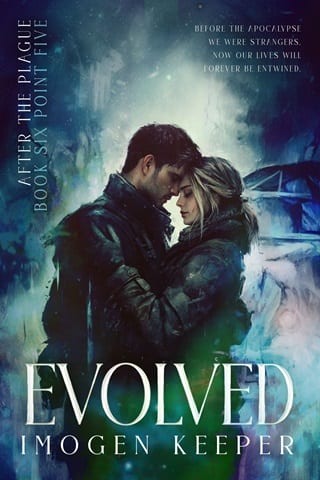1| Knox Silva
1| Knox Silva
OTTILIE
When Yorke was still in Germany
and Frankie was painting in her studio,
pretending the world wasn't on viral fire
F ACE MASKS, EAR COVERINGS, GLOVES, plastic shield, and a hospital gown wrapped around me like a shield, I stand ten feet behind the lone tech guy assigned to handle the first broadcast of my grandmother, Viola Wagner. Until a few hours ago, when the president who was elected at the top of the ticket went into a coma.
She is now the acting President of the United States of America.
This is her first address to the American people.
I always imagined a series of fiery debates, earnest interviews, carefully rehearsed speeches, a race of strategies and rallies and appeals to the American public—not a sick man ceding the office on the advancing tides of a catastrophic plague.
But here we are, amid rising death tolls, nightmare footage the globe wide, and me scrambling to write this speech, the most important of my life, hoping it can make a difference.
I hold my breath now, every muscle tight with anticipation.
So much has gone into it, laboring and lingering over every sentence, and it's out of my hands now.
Words, no matter how I finesse them, only account for about a third of a speech's success. The speaker's appearance, body language, the non-verbal messages they send are vital.
Gina, the last remaining member of Gran's inner team, and I selected her outfit carefully, every single detail. Her ash-blond hair is left down, a deviation from the French twist she's known for. It will read more informal, more comforting.
A simple strand of pearls sits around her neck, mauve lip stain, subtle eyeliner, just enough to highlight her eyes and hold viewers' attention, concealer to minimize redness and the smudges of fatigue under her eyes, but not the grief we all feel.
The grief must show. People need to see a trace of it and know they're not alone.
This moment, one that is fraught with emotion and fear, is a good one for the nation to have an older woman at the helm. During the war, people wanted a fighter, someone who exuded strength and even a dose of violence, but we're leaning into Gran's image as a wise, steady grandmother who has seen everything, and has the tradition and experience to carry us forward.
Her suit jacket is a deep marine blue that smacks of tradition, power, and gravity, and behind her is the reassuring tableau of power—The Oval Office.
"My fellow Americans," Gran begins gravely, her voice pitched just like we planned. "I greet you tonight during this … indescribable moment in human history. I know you're scared and desperate for answers. I assure you that every official in our government is working tirelessly in your service. We humans are no strangers to disease. Epidemics have occurred in every corner of time and space since the origins of humanity. It is not without precedent that we turn our faces toward this unique foe. Together."
She pauses, not looking away from the camera before her, letting people worldwide stop and ruminate on the word together while they stare at her face.
All around the Oval Office, silence is king.
Not that there are many to oppose it.
There's Gran behind the desk, facing Clyde, the lone Tech Guy with his lights and camera, and Crandall Wrensdale, the Chief of Staff to the sick President, Gina Usbeck, Gran's secretary, and me.
Only one other person stands within twenty yards of this room—Gran's single remaining secret service agent, Silva Knox, who's currently looming behind the door.
"That single word defines us beyond everything else— together— not just as a nation but as a planet," Gran continues. "We have the brightest of minds working together, armed with a battalion of scientific knowledge that is the great sum of all learning from all humanity from all times." Her voice grows here, a little louder, the pace a little faster as she punctuates the word all, her earnest soft brown eyes, so much like mine, locked on the screen, reminding viewers of wartime speeches, buckle-down sentiments, and you-can-do-this ethos. "Let us all support them by conducting ourselves with integrity in the face of fear."
She smiles here.
Softly.
Not a happy smile.
A recognition smile: human to human, like she's seeing the deepest ugliest parts of each of us and promising that it's okay, that we can do better, that she knows we can.
There's a magic to communication. Automatically, my expression has shifted to mirror hers, and I guarantee that Clyde, the Tech Guy, and Crandall Wrensdale, Gina, Knox Silva on the other side of the door, and people in homes across the country, their faces bathed in blue screen-light from their phones and computers and televisions, are mirroring it too, and hopefully finding a kernel of belief that they can do this.
"I turned sixty-three last year," she says. "Which places me somewhere firmly in the realm of elder, seasoned by time and experience …"
She goes on, detailing wars we fought and survived Covid and September 11, Pearl Harbor. I listen raptly, jotting down notes for lines that landed especially well, ideas to piggyback on for the next address, until she hits the ending, where she drives home the final most important message Americans should all go to bed with.
"When this is over, we will be united, and we will rejoice in our victory over this latest foe together. Please rest with confidence that I will use all my considerable experience, my education, and my years of service to the American people to lead you into the future that comes after the plague has been vanquished. And trust me, it will be vanquished. We have everything we need to survive this."
Perfect.
Gran came across confident, compassionate and capable.
I share a victorious nod with Gina, her face hidden behind her protective gear, her fluffy, graying red hair tied back in a bun somewhere under her protective cap. She's smiling, though; I can tell by her eyes.
If Gran is my whole family, Gina is my only friend.
And the happiness in the lines around her eyes tells me my work here is done.
As Gran finishes the signoff of her speech, I open my email on my tablet.
I checked in less than fifteen minutes ago, and more than a dozen new messages have come through. Speaker of the House, Head of NIH, the Secretary of Health, and the Secretary of Sanitation. I'll sift through them in detail later, but for now, there's one I've been waiting for.
About a month ago, Gran's ankles began to swell, and her energy dropped. She had shortness of breath and dizziness, even a few terrifying spells of disorientation where she forgot where she was.
It's her kidneys—we know that. Her doctors started her on an immediate round of new meds that helped, but with hospitals and labs slowed, it's taken time to get results back. They promised me it would come today.
And finally, here it is.
I scan the words—and they hit like stones. Renal Failure. Recommended dialysis. Slowing the decline.
No cure or imminent recovery, or quick surgery.
With proper treatment, the doctor writes, she could still have another decade.
Just one?
I pause just inside the doorway, my whole body going hot and cold by turns, and reread the email. There's no gray area, no opening to negotiation, manipulation, or compromise. I spend my life working on words, changing their order—but that's useless here.
Gran is … not just sick, she's sick sick, organ-failure sick.
Terror closes up my throat.
My eyes burn.
I haven't cried in public since I was about four years old, and that's not about to stop now. I pull open the door, the heavy brass handle hard in my hand, and shove my way blindly into the hallway and smash directly into a person.
A big, solid person.
With a big, deep voice.
"Hey," he says soothingly as my shoulder collides with his arm.
Knox Silva—Agent Silva.
I jerk away and immediately drop my tablet.
It plummets to the red carpets with a loud thud.
"Whoa." His hands curl around my shoulders to steady me, a flicker of a smile rolling over his features. "You okay?"
Don't ask how he knows something is wrong. Knox seems to see everything about me, and it never fails to knock me off my axis. He's always been like that. Ever since we met.
Clyde, Gina, and Wrensdale are looking in our direction, eyes narrowed behind their shields. Hopefully, Clyde's recording settings will have filtered out the thud of my crashing tablet.
I pull the door closed silently, then bend forward to pick it up.
Knox has already done it, though. His dark eyes, behind a plastic shield, probe mine as he straightens, the pale blue mask over his mouth accentuating his olive-toned skin and hiding his expression.
It always feels like he sees me too deeply, like his gaze is a battering ram blasting past all my carefully constructed defenses.
"Everything okay?" His voice is muffled by his mask, but low-pitched, like he's speaking only to me.
Because Gran's health was uncertain, he, Gina, and I have been distancing and wearing masks longer than everyone else, even before news of the virus hit.
My breath hot against my skin inside my mask, I say, "Dr. Bakshi says she needs dialysis." It feels awful saying it out loud, like there was a scratch in my own skin, and with every word, I'm clawing it deeper. "She wants her to undergo her first-round tomorrow. She's arranged for a machine to be delivered and installed here, and a nurse to administer treatment. Can you oversee their arrival?"
"Yeah." He's quiet, studying me. Finally, he says, "I'm sorry. It's not what I was hoping for either."
Instantly, my eyes burn again.
We've been working together for nearly five years, but this is the closest we've ever stood. I can make out individual eyelashes, even behind the plastic shield, a freckle over his left brow, and when I let myself look directly into his eyes, I can almost feel the swirlings of his own brain grappling with the virus, the change in Gran's position from VPOTUS to POTUS, her illness, me standing before him, two members of a dwindling group.
It's all there, like looking at the images NASA takes of galaxies swirling with stars and planets, but it's a whole world inside him, and I can only touch the surface.
It makes me wonder what he sees of me?
Can he sense my fear?
Do I want him to?
Would it feel better if he did? I don't know.
A part of me longs to find out, to pull off my shield and mask, to peel off his, to look at him, really truly look, and more, let him look at me. Maybe go a step further, step into his body, feel the warmth of him.
It's a stupid thing to want a hug—indulgent and selfish and small in the face of the existential threat facing humanity.
My life isn't about wanting things and taking them. It never has been.
So I back away, hugging my tablet against my chest like a shield, and reminding myself that I am not emotional. Ever. "Goodnight, Agent Silva."
I don't look back, don't even pause or breathe fully until I'm alone in the temporary staffing quarters we've been assigned, my footie-covered sneakers, gloves, hazmat shield, mask, and earplugs on the bench, reeking of hand sanitizer, until I've climbed into the shower and scrubbed myself with soap. No matter how long I let the hot water run, I stay cold.
Gran just told people they'd meet again. I wrote those words.
And it was a lie.
The latest estimates put mortality upwards of sixty percent.
Some of us will meet again, but most of us?
We'll be … gone.
I'm not sure which scares me more—the idea of dying from this flu … or surviving it and living in the ashes.
 Fullepub
Fullepub 



